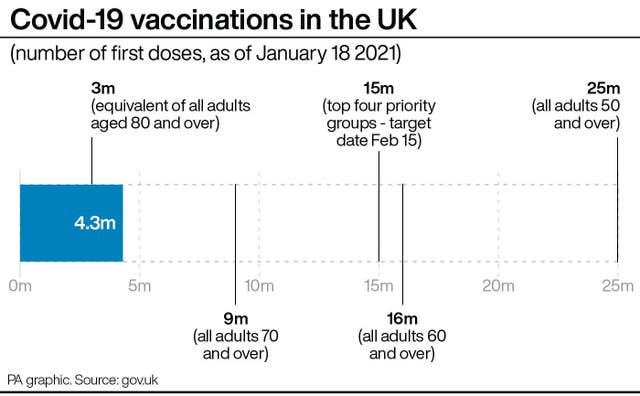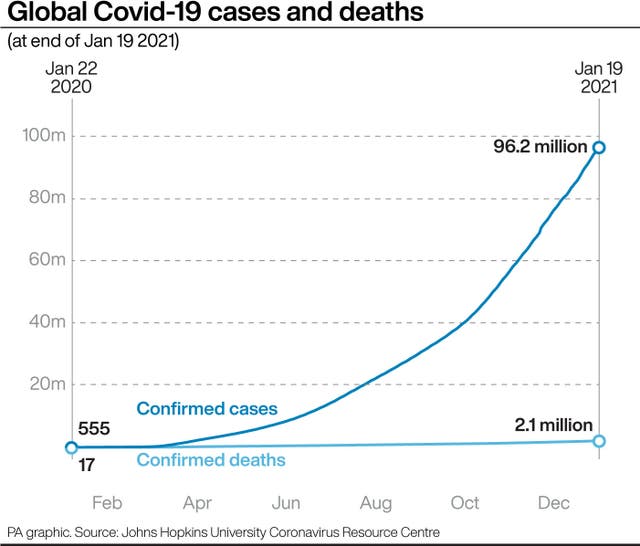Scientists warn Covid deaths will continue to rise after record daily toll
Coronavirus infections continue to fall but experts say it will be some days before fatalities follow.

Deaths from coronavirus will continue to rise for some days to come, scientists have warned after the UK recorded its highest daily death toll since the pandemic began.
Officials believe there are signs the various lockdown measures in place around the country are having an effect as the vaccines are rolled out, with infection rates continuing to fall.
But the lag between people becoming infected and then being admitted to hospital means deaths will probably not start coming down until towards the end of the month.
Dr Michael Head, senior research fellow in global health at the University of Southampton, warned there could be further “record-breaking” days concerning the number of newly reported deaths.
“The lockdown is starting to show an effect on new cases per day,” he said.
“However, a proportion of the cases from early January will be admitted to hospital approximately this week, and deaths from those cases will likely peak around the end of this month.
“Therefore, we will alas see several more ‘record-breaking’ days in terms of newly-reported deaths.
“Over the coming weeks, the combination of the lockdown and the impact of the vaccine rollout will start to translate into a reduction of severe Covid-19 cases.”

His warning came after the UK recorded a further 1,610 coronavirus deaths on Tuesday – the highest number reported on a single day since the outbreak began.
Public Health England (PHE) said the figure – for those who had died within 28 days of testing positive for Covid-19 – brought the UK total to 91,470.
Separate figures published by the UK’s statistics agencies for deaths where Covid-19 has been mentioned on the death certificate, together with additional data on deaths that have occurred in recent days, show there have now been 108,000 deaths involving the virus in the UK.
PHE medical director Dr Yvonne Doyle said coronavirus-related deaths would “continue for some time throughout this second wave”.
“Whilst there are some early signs that show our sacrifices are working, we must continue to strictly abide by the measures in place,” she said.
“By reducing our contacts and staying at home we will see a fall in the number of infections over time.”

Ministers have insisted the programme to vaccinate 14 million of the most vulnerable – including elderly care home residents, frontline healthcare staff and the over-80s – by mid February remains on track.
But while more than four million people across the UK have now received a first dose, the latest figures show the numbers getting the jab have fallen in recent days, from more than 324,000 on Friday to just over 204,000 on Monday.
Asel Sartbaeva, a vaccine specialist from the University of Bath, said there was a “big problem” with delivery due in part to a shortage of the equipment needed to store the vaccines at low temperatures – down to minus 70C in the case of the Pfizer vaccine.
She said the Government had failed to take advantage of equipment in university laboratories or equipment that was normally used for transporting food.
“The Government is not thinking laterally and that is not using the equipment that is available at the moment because of the lockdown and could be used for this,” she told BBC2’s Newsnight.
Coronavirus infections continue to fall but experts say it will be some days before fatalities follow.
Meanwhile, retailers in Scotland have warned they could lose almost £1 billion in total as a result of the latest lockdown after First Minister Nicola Sturgeon confirmed shops and many other businesses must remain shut until the middle of February.
In addition to extending the lockdown, with its stay-at-home order to Scots, Ms Sturgeon also confirmed schools and nurseries across Scotland will stay closed to most youngsters until at least the middle of next month.
In Wales an app has been launched to support people experiencing the longer term debilitating effects from coronavirus, known as long Covid.
The bilingual app has been developed by the NHS Wales respiratory health group on behalf of the Welsh Government and is designed to help people in their recovery from the disease.





